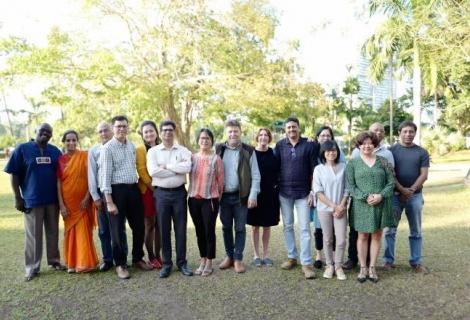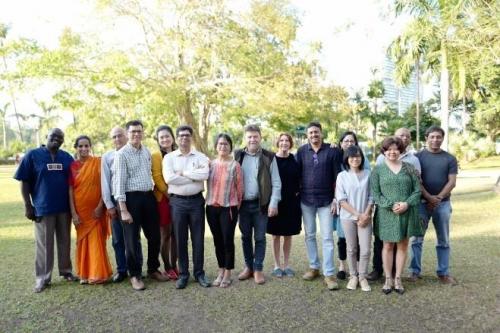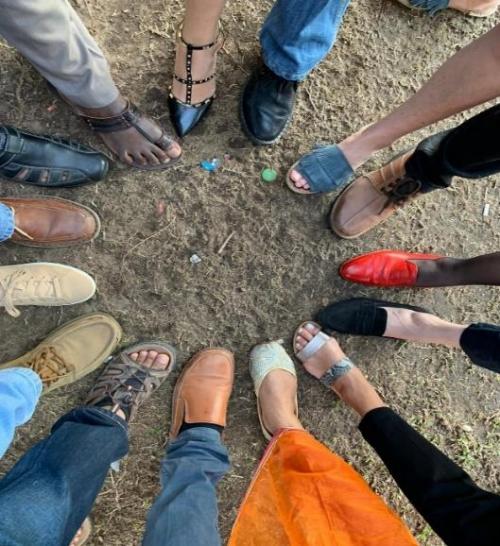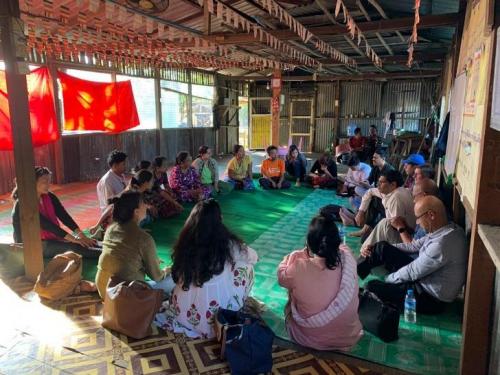ActionAid’s Asia Regional Meeting 2020

ActionAid International’s Asia Leadership came together in Yangon from 4-6 February to collectively celebrate our achievements, share learning from good and innovative practices across the region, and to critically reflect on emerging external and organizational contexts. This collective space presented an opportunity to deliberate on how we can better position ActionAid as a relevant and impactful actor at local, national and global spaces.
The meeting started with external speakers – Dr. Ashley South and David Gilmour – who shared their insights on conflict and refugees in Myanmar and the neighboring countries. The Asia Directors complemented the external context analysis by sharing their respective contexts from South Asia, South East Asia and the Middle East. The rise of right-wing nationalism, subsequent shrinking of ‘progressive’ civil society spaces and the dilution of universality of human rights stood out as emerging challenges across Asia. Countering such a regressive trend demands building solidarity among progressive civil society actors, social movements and poor and excluded communities who are often adversely impacted the most. We reflected that ActionAid is increasingly working in conflict situations and on various issues concerning ‘people on the move’ which calls for strengthening our understanding and programming in these areas.
During the three days, we had the opportunity to listen to and learn from various research, advocacy and programming work from across Asia. This included: evaluation findings of AA Afghanistan’s women’s rights work; research and initiatives on violence against women in the workplace from AA Arab Region and AA Vietnam; AA Bangladesh’s Rohingya response learnings; insights from AA Cambodia’s Mangrove campaign; AA India’s research on sand mining and pasture commons; AA Myanmar’s research and advocacy on civic engagement; youth engagement initiatives from AA Nepal and AA Palestine; and, AA Thailand’s land rights campaign. In addition to the impact of these initiatives, the sharing also highlighted rich experiences of partnerships with various agencies – people’s organization, social movements, trade unions, academia, governments, youth groups, media, etc. A one-pager brief of each of the above innovations and good practices from Asia will be compiled and shared across the Federation. We also had the opportunity to reflect on the priorities and support provided by the Asia Regional Team. Asia countries emphasized on the need for the regional team to be more external facing in addition to continuing to enable to build a more agile and networked federation.
The deliberations on ActionAid’s Strategy Implementation Framework (SIF) was another highlight of the meeting. The Asia team emphasized on the importance of focusing on not only ‘what’ we do but more importantly on ‘how’ we do our programs and campaigns so that we remain relevant, effective and impactful in the changing context. The Asia team sees the need to do a reprioritization for the next SIF guided by our expertise, relevance (to our core constituencies of women and young people) and focus on where we can create the biggest impact. We also discussed the importance of developing a more focused research and policy agenda connected to our areas of focus as well as building knowledge and activist leadership. The meeting also
highlighted the need for developing much clearer dual citizenship indicators and mutual accountability mechanisms. The Asia countries are committed to take this conversation forward with their respective teams and provide more detailed contributions to the development of the new SIF.
As part of the discussions on Long Term Finance and Funding Strategy (LTFFS) the Asia team critically reflected on the internal and external shifts needed to strengthen financial sustainability of the Federation. We emphasized on the need to focus more energy on accessing alternative funding sources and enhancing fundraising innovations rather than only limiting the conversation to the distribution of depleting resources. However, we also acknowledged the need for more fairer internal resource distribution between the donor owners and implementing countries.
We also deliberated on the Federation Communications Framework where the Asia Directors appreciated the support provided by the GS Communications Team. The Asia Team remains committed to enabling the achievement of the four strategic priorities outlined in the Communications Framework – enhancing internal communications; reviewing our brand value and identity; strengthening our narrative and storytelling; and, building our media profile.
Continuing our commitment to feminist leadership, the Asia team reflected and shared how as leaders each one of us are advancing feminist leadership in our organizations. During this meeting we focused on three aspects of the Top Ten Basics of Feminist Leadership – self care and caring for others, inclusion and sharing power.
As part of the meeting, AA Myanmar had arranged a community visit to Hlaing Tharyar Township in western Yangon where AA Myanmar is implementing a program to address violence against women. It was very inspiring to listen to the stories of change from the women para-legal community volunteers and the male role-models. They proudly shared how they have managed to tackle the powerful patriarchal norms prevalent in their society and built trust with women and men in the community as well as the local administrative authorities. We ended the community visit with an enthusiastic statement from one of the women: “We cannot guarantee violence against women is reduced in the whole township but we can proudly say it has significantly reduced in our community….The capacity building support, legal information and solidarity from ActionAid Myanmar has built our confidence to fight against violence against women in our community and to engage with local authorities on these issues…”


